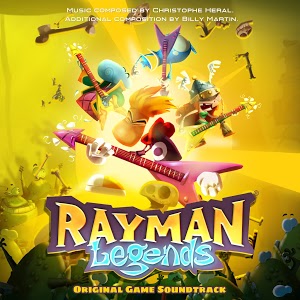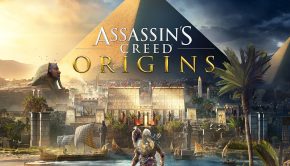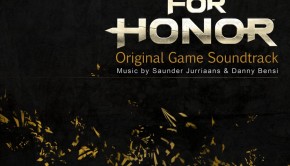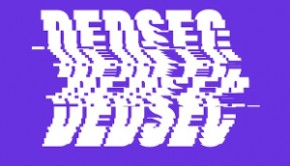Rayman Legends Original Soundtrack
 |
Album Title: Rayman Legends Original Soundtrack |
| Record Label: Ubisoft |
|
| Catalog No.: N/A |
|
| Release Date: August 29, 2013 |
|
| Purchase: Download at iTunes |
Overview
Rayman Legends continues Ubisoft’s wild success with the rebooted franchise, with Michel Ancel’s iconic chap bounding through beautifully designed levels in this addictive sequel. Rayman Origins brought a new art style and a revitalised brand of side-scrolling gameplay; Legends expands on the first game with themed worlds, 3D bosses and more ingenious platform puzzles to zip through. Perhaps the icing on the cake, however, are levels set in motion to specific musical songs, choreographed to perfection. Do the tunes match the trials? Read on to find out…
Body
Like the game it scores, Christophe Héral and Billy Martin’s music for Rayman Legends is as wild, wacky and tongue-in-cheek as its armless inspiration. It’s a score unafraid to drop patently obvious references, homages and winks towards both the classical and film worlds. This becomes immediately identifiable with the first set of tracks (the album arranges things chronologically, mirroring the unlockable areas opening up in the game) taken from the Medieval opening section. The jump to full orchestra after the ukulele dominated soundtrack to Origins is a welcome one and the lean towards ‘epicness’ – in both sight and sound – is clearly telegraphed, with strains of Wagner’s Ride of the Valkyries interspersed throughout the beginning pieces. Wagner’s influence is clearly heard in “Mysterious Swamps” and “Babel Tower”, two tracks that set the trend for Legends’ jaunty, fully-orchestrated sound. “Medieval Theme”, the closest to a period piece on the soundtrack, plays on banquet hall stereotypes with the main melody whistled, fiddled and whooped – the start of many styles that make the soundtrack so varied and enjoyable. The Medieval melody has the feel of a jig, evoking constant movement, a quality fundamental to Rayman Legends’ frenetic gameplay.
Of course, despite plumping for a grander sound, Héral and Martin can’t help but keep the tone playful and irreverent. As the music to the Medieval world (what is this, The Crystal Maze?) begins to culminate, the music can’t help but defuse its crescendo by bringing in unconventional instruments. “Castle Invaded” introduces some groovy double-bass, again revisiting the Medieval melody, albeit with added whistling, fiddle, ukulele – and appearing for the first, but not last, time – mariachi inspirations. “Medieval Dragon” comes hot on its tail with a kazoo, used in Rayman Origins during mosquito-based flight levels, and some comedy operatic singing. What would otherwise deflate most soundtracks is instead leveraged to comedic effect, keeping the soundtrack fresh and unpredictable at every turn.
This is highlighted by the next track, “The Swamp Whistler”, one of the occasional oases of calm amidst the slapstick craziness. Focusing on the primary audio motifs from Origins – ukulele and whistling – it’s a gentle, laid-back holdover and works as a palate cleanser between wildly differing styles of music. A flavour of the Orient influences the next batch of tracks, especially prominent in “Lost in the Clouds”, the lush strings and shakuhachi creating a piece similar in sound to – gasp! – Shenmue. For a brief moment the wacky percussion melts away, replaced with refined, mediated chords from the string section.
“Trip to the Jungle” continues the journey through undulating musical variation, the meandering strings and deep percussion conveying a touch of Maurice Jarre. “The Adventure Begins” is another standout piece, at times recalling the best of Giacchino and the great scores of old: up-tempo percussion, Bolero-esque motifs and a genuine feeling of greatness on the horizon. The fact it’s followed by “Orchestral Chaos” – ninety seconds of pure orchestral magnificence – is exemplary. It’s a wild blast that shows off the range that can be achieved with an orchestra, so much so that this one track would be perfect to educate the younger generation on the magnificence of classical music. Given “Orchestral Chaos” acts as inspiration for the choreography of a level, there’s a degree of pleasant nostalgia in relistening to the piece as you recall each leap and kick, as if burned into your mind as muscle-memory. After another in the ‘Whistler’ pieces – again, laid-back and gentle – the soundtrack takes an unexpected but welcome turn into mambo territory. It’s out of the blue but by this point you’ve come to expect the left-field and it signals entry into the food themed portion of the game scored, rather brilliantly, by mariachi bands. Although hinted at earlier in the score, here the mariachi madness makes an all-out assault on the familiar themes – there are whoops and horns galore with “Luchador”, the standout track. Another interlude bookends the madness, this time with more Eastern influences boosting the meditative atmosphere of “The Chef Whistler”.
What comes next is a departure from the orchestral whimsy that defines Rayman Legends, but a departure sure to ring a few bells and excite a few fans of 007. Yes, in perhaps the most blatant homage of the soundtrack, Christophe Héral cheekily infuses the Bond theme into not one but four pieces. It’s clear to hear but rather than affronting the work of Norman, Barry and Arnold it evidently delights in pilfering motifs of the spy series, right down to the track names themselves. “20,000 Lums Under the Sea” adds a sonar beep for effect which, coupled with the touch of theremin, recall Eric Serra’s score to GoldenEye once the Bond homage begins to show. “Dive Another Day” features beatbox percussion while “The Spy Who Kicked Me” has the most prominent moments of Bond spoofery: twangy guitars, sharp horns and that familiar string refrain. Of course, given Rayman is a property of Ubisoft, there’s also a slinky bassline that could easily score a Splinter Cell game along the lines of Amon Tobin’s masterful work on Chaos Theory.
The remainder of the soundtrack is as eclectic as the rest – a Greek themed area prompting a familiar Grecian dance in “Shield and Sirtaki” while “Another World” will be familiar to those who have completed the game, given its multi-layered melody is gradually constructed as players progress through the campaign. Yet another spy series is referenced as well – the opening moments of “Strategy and Spying” featuring a swift yet unmistakable nod to Mission: Impossible. Included as bonus tracks are 8-bit reinterpretations of the two musical level pieces – “Orchestral Chaos” and “Grannies World Tour” – as well as the main Rayman theme.
Summary
The score to Rayman Legends is as eclectic, strange and glorious as the game it soundtracks, combining disparate instruments, influences and styles into one hugely enjoyable mess. That word does Christophe Héral and Billy Martin a disservice; what we have is tightly produced and brilliant quality, but never shies away from poking fun at itself (or some legends of the field!) The only disappointment comes from the lack of the outstanding covers found in the game – the mariachi version of ‘Eye of the Tiger’ is much missed but understandable given the problems of licensing. Other than that, this is a fantastic listen: rewarding, surprising and full of energy.
Do you agree with the review and score? Let us know in the comments below!
4.5
Posted on May 29, 2014 by James Marshall. Last modified on May 29, 2014.














